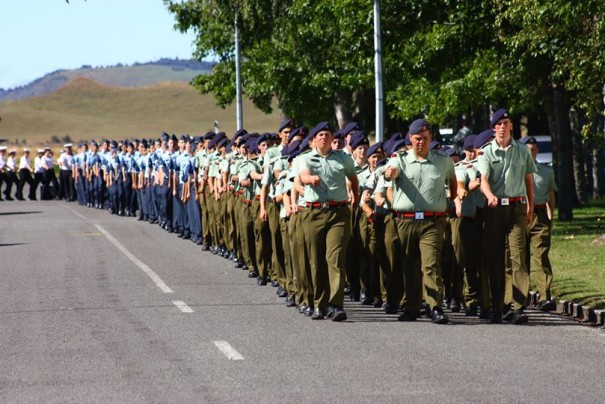Cadet 150

Rau rangatira mā, e kui mā, e koro mā, e hine mā, e tama mā, tēnei aku mihi māhana ki a koutou. Kia ora tātou katoa. Distinguished guests, ladies and gentlemen, young women and young men, warm greetings to you all.
I specifically acknowledge: Lieutenant General Rhys Jones, Chief of Defence Force; Rear Admiral Jack Steer, Chief of Navy; Major General Dave Gawn, Chief of Army, Air Vice Marshall Peter Stockwell, Chief of Air Force; Peter Marshall, Police Commissioner; Commodore Bob Morrison, Royal Australian Navy; Major Alain Thibault, Royal Canadian Cadets; and Brigadier Jon Broadley, Director General Reserve Forces and Youth Development - tēnā koutou katoa.
Thank you for inviting me here today. As Patron of Cadet 150, I am delighted to help the New Zealand Cadet Forces mark its notable anniversary.
All too often we hear about what young people are doing wrong. Young people are accused of being selfish and self-centred; of being defiant of authority, either civic or parental; and with having little respect for law, order and decency. Fortunately, young people like you all on parade today challenge those assertions, and prove that we can have confidence in our young people. As the Governor-General I’m always heartened to see evidence of young New Zealanders succeeding and achieving.
Few organisations in New Zealand can claim to have existed continuously for 150 years. It is a significant achievement, and one that has directly and positively impacted on the lives of tens, if not hundreds, of thousands of young New Zealanders.
Since the founding of the first cadet unit at what is now Otago Boys’ High School, there has been enormous social, political, economic and technological change in New Zealand. When the first unit was formed, the New Zealand Wars were still raging, universal suffrage was still 30 years away, gold and wool were mainstays of our exports and European adventurers were only just venturing into New Zealand’s hinterland. In those early years the cadet units were formed in schools and controlled by a school’s headmaster. The emphasis of training followed the example of British public schools, and was based on rigid discipline and shooting marksmanship.
The focus now has been adapted, in step with our changing world, to develop confident community-minded citizens for New Zealand. That’s not to say those first cadets would be completely mystified by what 21st century cadets get up to. Equipment and training differ, but the core values of respect, integrity, loyalty and discipline have the same meaning now as they did in the 19th Century.
Over the past 150 years, the Cadet Forces have expanded and evolved. The Army-based New Zealand Cadet Corps has been joined by the Sea Cadet Corps (1929) and the Air Training Corps (1941). In the Cadet Forces centenary year, 1964, the NZCF peaked at 1000 officers and 54000 cadets in 198 units. And while the modern cadet has amazing opportunities to learn new and useful skills of a type undreamt of in 1864, it is the NZCF core values and how a cadet employs them in his or her everyday life that will ultimately have the most impact.
Many of you will have aspirations of going on to join the Army, Navy or Air Force. Young men and latterly young women of the NZCF have gone on to serve in the Army, Navy or Air Force. Some have chosen to serve as officers in their cadet units. Others may take your experience to put to use in the Police Force or other service organisation. Most of you will choose to go on to other careers and pursuits. Whatever you choose to do, treasure the time spent and mates made in the NZCF, they will be beneficial for your future.
I agreed to be the patron of Cadet 150 because the NZCF has been, and remains, a premier youth organisation. It has and continues to provide a safe, enjoyable and challenging environment for young New Zealanders to grow. Throughout its 150 years the NZCF has ensured that today’s young people are every much as good as yesterday’s young people. In saying that, I am confident that you young people as much as yesterday’s young men and women will step up when you are called upon to do so. My hope is that unlike your predecessors who went to two World Wars, your future will be different.
In conclusion – and I know from experience how much people on parade enjoy hearing those words – I congratulate the New Zealand Cadet Force on 150 years of service to New Zealand’s youth. It is a remarkable achievement and in celebrating this event we are paying tribute to all of the young men and young women over 150 years who have been Army, Navy or Air Force cadets.
At this point I want to acknowledge the support that the NZCF has received over 150 years from the Army, the Navy and the Air Force. Equally as important is the support cadet units have received from the wider community. In particular, I thank the three Cadet Corps associations, the adults around the country who have taken up Cadet Force commissions, the parent support committees connected with each unit, and the friends and family members who encourage and support cadets to take part. Their voluntary contribution has been a major factor in the success and survival of the cadet movement.
As the former US Secretary of State and Chairman of the US Joint Chiefs of Staff Colin Powell said: “Organisations don’t really accomplish anything. Plans don’t accomplish anything, either. Theories of management don’t matter much. Endeavours succeed or fail because of the people involved. Only by attracting the best people will you accomplish great deeds.”
Congratulations to you all for playing your part and for being the best you can be so that cadet units continue to achieve great deeds.
Kia ora huihui tātou katoa
